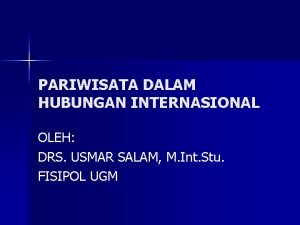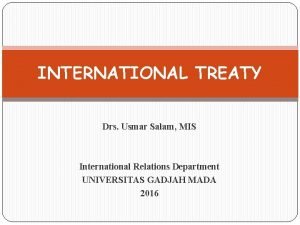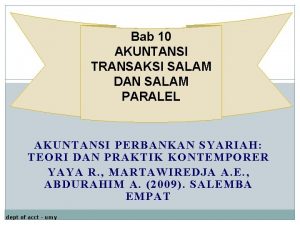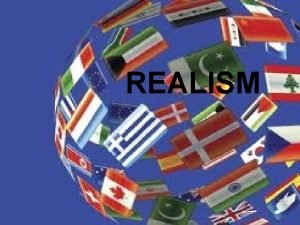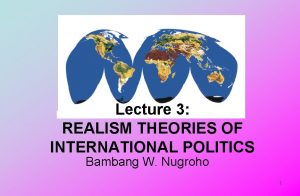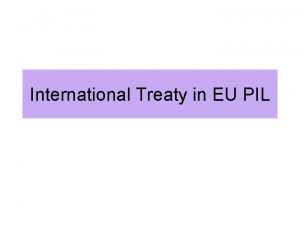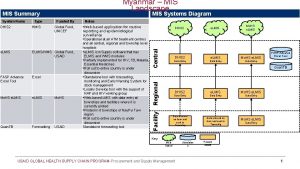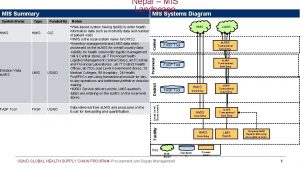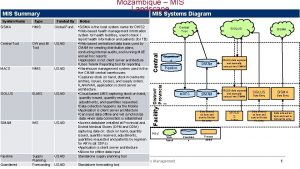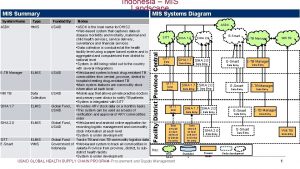INTERNATIONAL TREATY Drs Usmar Salam MIS International Relations

























- Slides: 25

INTERNATIONAL TREATY Drs. Usmar Salam, MIS International Relations Department UNIVERSITAS GADJAH MADA 2016

Definition “ Perjanjian dalam bentuk dan nama tertentu. Yang diatur dalam hukum internasional yang dibuat secara tertulis serta menimbulkan hak dan kewajiban di bidang hukum publik “ - UU NO. 24/2000 International Law 2012

What is treaty ? “ An international agreement concluded between states in written form and governed by international law, whether embodied in a single instrument or in two or more related instrument, whatever is particular designation “ - Art. 2 (1. a) VCT 1969 International Law 2012

International Treaties which bind to Indonesia Through the following ways : • Signature • Ratification • Diplomatic notes exchange • As agreed in the agreement International Law 2012

Form and Title of Treaties q Treaty : a form of international agreement provided very important provisions that binds entirely to the Contracting States. In general, Treaties are used in multilateral context, but there are examples where they are used bilaterally. e. g. Border Treaty between RI-PNG q Convention : Usually instruments produced by an international organization, e. g. • Multilateral: UNCLOS 1982 • Bilateral: Convention between RI-USA on Avoidance of Double Taxation International Law 2012

Form and Title of Treaties Agreement : used as a bilateral treaty, but in practises it has also used in multilateral context. e. g. Trade Agreement Protocol : often used to describe agreement of a less formal than those entitled : Treaty or Convention. e. g. Kyoto Protocol Mo. U : often as operational arrangement under the framework of international agreement/used for the regulation of technical matters. e. g. Oslo Moratorium (between RI-Norwegia) International Law 2012

Form and Title of Treaties The form and title of treaties in practice are very wide, such as: Treaty, Convention, Agreement, Memorandum of Understanding, Protocol, Charter, Declaration, Final Act, Arrangement, Exchange of Notes, Agreed Minutes, Summary Records, Process Verbal, Modus Vivendi, and Letter of Intent International Law 2012

The Making of Treaty 1. 2. 3. 4. 5. 6. 7. 8. Negotiation Adoption of the text of a treaty Authentication of the treaty Consent to be bound Signature Ratification Accession Reservation International Law 2012

VCT 1969 & Act. No. 24/2000 VCT 1969 an international agreement concluded between states in written form and governed by international law, whether embodied in a single instrument or in two or more related instrument, whatever is particular designation International Law 2012 Act No. 24/2004 an agreement, in a certain form and under a certain title, governed by international law, made in writing and creates certain rights and obligations within the scope of public law.

Act. No. 24/2000 on International Treaty TREATY MAKING PROCESS Preliminary Negotiation Drafting Acceptance Signing International Law 2012

Preliminary Process (1) A preliminary process is undertaken by negotiating parties regarding the possibility of concluding a treaty. This phases could be done through the initiative by Indonesian state institutions or counterpart. International Law 2012 If the initiative come from Indonesia, the initiating institution shall handle and coordinate among related institutions concerning the planning of the treatymaking process. DFA will provide opinions on political and juridical considerations on the basis of national interest.

Preliminary Process (2) The coordination itself will be done through inter-departmental meeting or correspondence. If the draft of cooperation agreed by the parties, the draft of treaty would be sent to the counterpart by DFA e. g. Directorate of Treaties on Economic and Socio-Cultural Affairs, Directorate of Treaties on Politic, Security and Territorial Affairs or Regional Directorates International Law 2012 If the initiative come from the counterparts, they will inform RI their desire to make treaty through their embassy in Indonesia to the Indonesian focal point or to Ind. Emb/Rep. in their country. the Indonesian focal point will coordinate among related RI institutions by holding interdepartmental meeting to discuss a draft to be provided as “a counter-draft”.

Preliminary Process (3) Furthermore, if the counter-draft has been agreed by among related institutions, the counterdraft would be communicated to the country concerned by the DFA. International Law 2012 If the counterpart agreed with the counter-draft given by the Indonesian side, the negotiation phase can be waived and the communication may be conducted by correspondence or exchange of document until the signing process.

Negotiation Process (1) In this phase, the parties will address every matters that have not been agreed in Preliminary Process. This phase maybe use as a tool for reaching understanding between the parties concerning the provisions of the draft of the treaty. International Law 2012 Indonesian Delegation should have a guidance which shall contain background analysis of the issue as viewed from the political, legal and other aspects which may affect the Ind. national interest. The Delegation Guideline of the RI shall requires the approval of the Minister for Foreign Affairs.

Negotiation Process (2) In multilateral treaty negotiation, it usually has its own “rules of procedure” that requires a letter of Credence of the delegation to the negotiation. In several cases, the Credentials may be accompanied with Full Powers which giving the mandate to the Head of the Delegation to sign the document resulted from the negotiation. International Law 2012

Drafting Process is a process which forms the draft of a treaty. In this phase, the delegation will give its initialed draft of the treaty to be agreed by the parties. The parties may also drafting Agreed Minutes, Minutes of Meeting, Records of Discussion or Summary Records that containing the agreed matters, un-agreed matters and matters related to the next schedule of negotiations. International Law 2012

Acceptance Process a process of accepting the text of agreement which has been drafted and agreed upon by the parties. In a bilateral negotiation, an agreement upon an initial text may be deemed as an "acceptance" which is usually indicated by affixing the initials of each head of delegation. International Law 2012

Signing Process Signing is normally done after the conclusions of the negotiations. However, in multilateral or even bilateral agreement, the signing itself does not always constitute the act of binding of the parties as signatory states. The binding to a treaty may be conducted by ratification/accession/ acceptance/approval. International Law 2012

Ratification Def : formal act whereby one state declares its acceptance of the terms of the treaty and undertakes to observe them. > VCT 1969 : ratification is one of the means of expressing consent to be bound by a treaty (Art 11). > Act No. 24/2000 : - a legal action to bind one’s self to treaty in the form of ratification, accession, acceptance and approval - A Law/Act, or Presidential Decree International Law 2012

By a Law 1. 2. 3. 4. 5. 6. Matters pertaining to politics, peace, defence and state security; Alterations to or delimitation of the territory; Sovereignty or sovereign rights of state; Human rights and the environment; Formation of new legal norm (Law Making Treaty); Foreign loans and/or grants-aid. (Art. 10). International Law 2012

By a Presidential Decree - The material which is not stipulated in the Art. 10, done by a Presidential Decree. (Art. 11) - Treaties which require ratification to enter into force, but contains subject matters – procedural in nature and need prompt implementation without affecting national law. (Elucidation of Art. 11) e. g. : agreements relating cooperation in the field of science, technology, economy, trade, culture, commercial maritime, taxation, investment and other agreements which are technical in nature. International Law 2012

Guidelines in Drafting the Treaty for Indonesia 1. 2. 3. 4. In accordance with the national interest Based on equality Mutual benefit Considering to national and international law International Law 2012

Context of International Treaties that are Required 1. 2. 3. A background Analysis of the problem based on the political aspects, juridical, and other aspects that affect the national interest The position of Indonesia, suggestions and adjustments that can be made to reach agreement International Law 2012

The End of an International Treaty When : 1. There is an agreement to terminate the treaty that appropriate with the procedures of international treaty 2. The purpose of the agreement has been reached 3. There is a fundamental changes in implementation of the treaty 4. There is a party who makes an infringement International Law 2012

Cont’d When : 5. There is a new treaty as the replacement 6. The emergence of new norms in international law 7. The disappearance of the treaties object 8. Inflicting to national interests loss International Law 2012
 Usmar salam
Usmar salam Usmar salam
Usmar salam Allahumma antas salam wa minkas salam tabarakta
Allahumma antas salam wa minkas salam tabarakta Akuntansi transaksi salam dan salam paralel
Akuntansi transaksi salam dan salam paralel Parallel salam
Parallel salam Allahumma antassalam wa minka salam tabarakta
Allahumma antassalam wa minka salam tabarakta Amalgaamafscheider
Amalgaamafscheider Pendapat dari drs. wasty soemanto, m.pd
Pendapat dari drs. wasty soemanto, m.pd Melanie cosby temple
Melanie cosby temple Cisco drs backup
Cisco drs backup Dr koh and trory
Dr koh and trory Drs.wa.gov/oaa
Drs.wa.gov/oaa Drs atypique
Drs atypique Drs
Drs Drs atypique
Drs atypique Temple university disability services
Temple university disability services Drs hardwarezone
Drs hardwarezone Drs abcdefg
Drs abcdefg Employee relations in public relations
Employee relations in public relations Dimensión fisica proyecto de vida
Dimensión fisica proyecto de vida La madre de mi padre es mi ___
La madre de mi padre es mi ___ Mis mai a mis tachwedd
Mis mai a mis tachwedd Mis mai a mis tachwedd
Mis mai a mis tachwedd Mis actos son un reflejo de mis creencias
Mis actos son un reflejo de mis creencias Nature of realism
Nature of realism Realist theory of international relations
Realist theory of international relations
